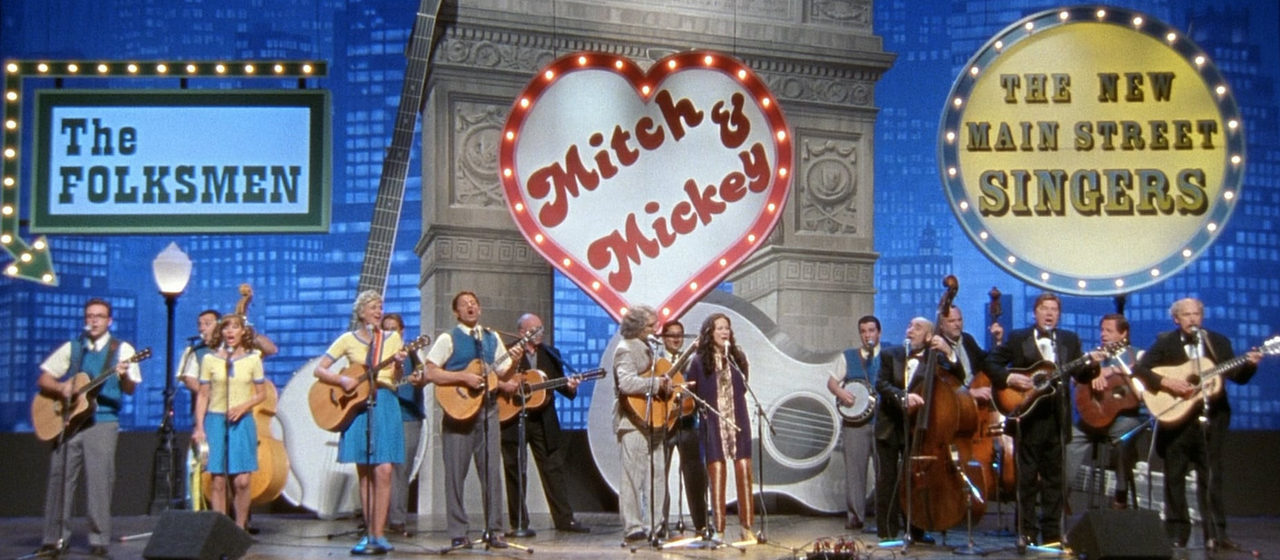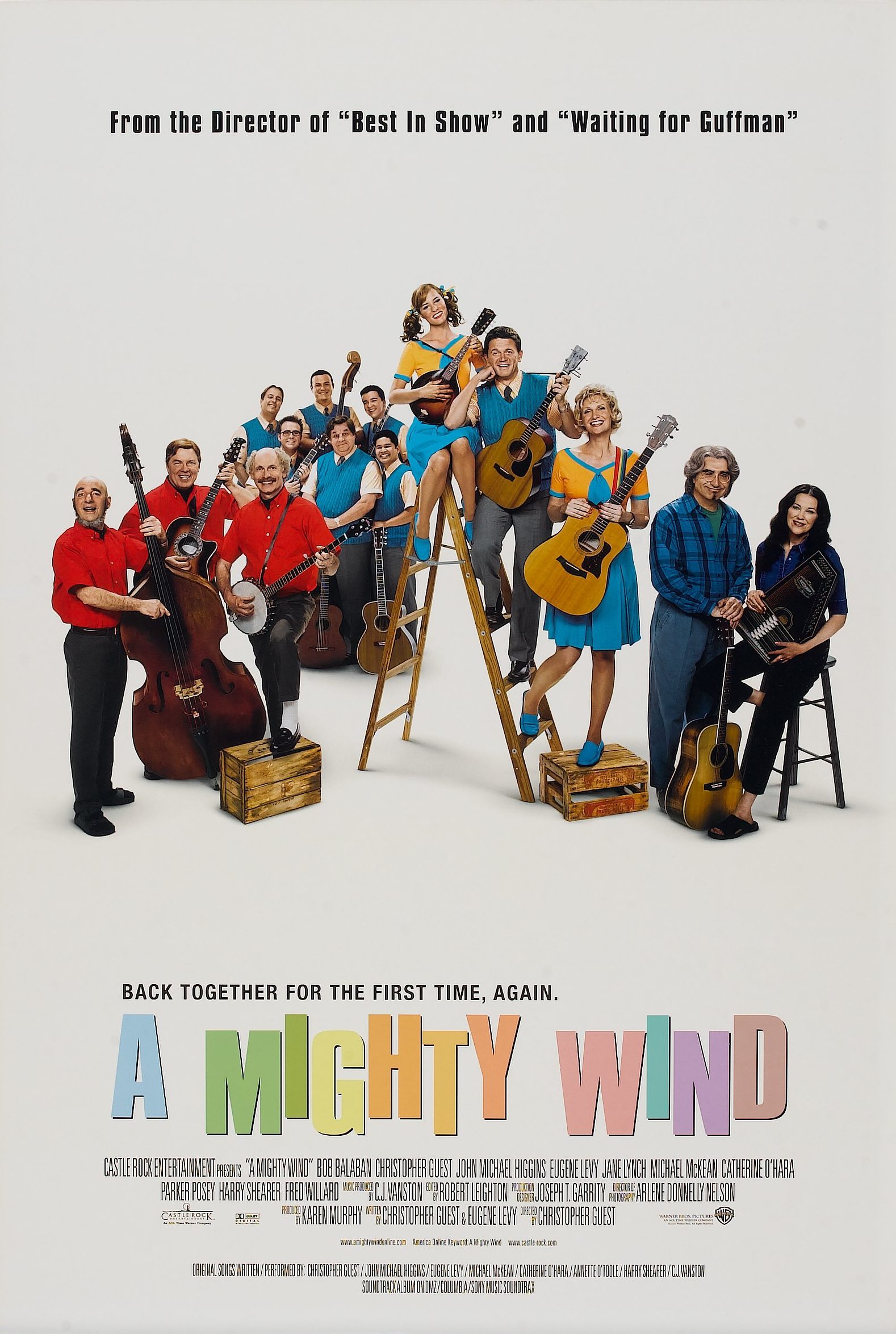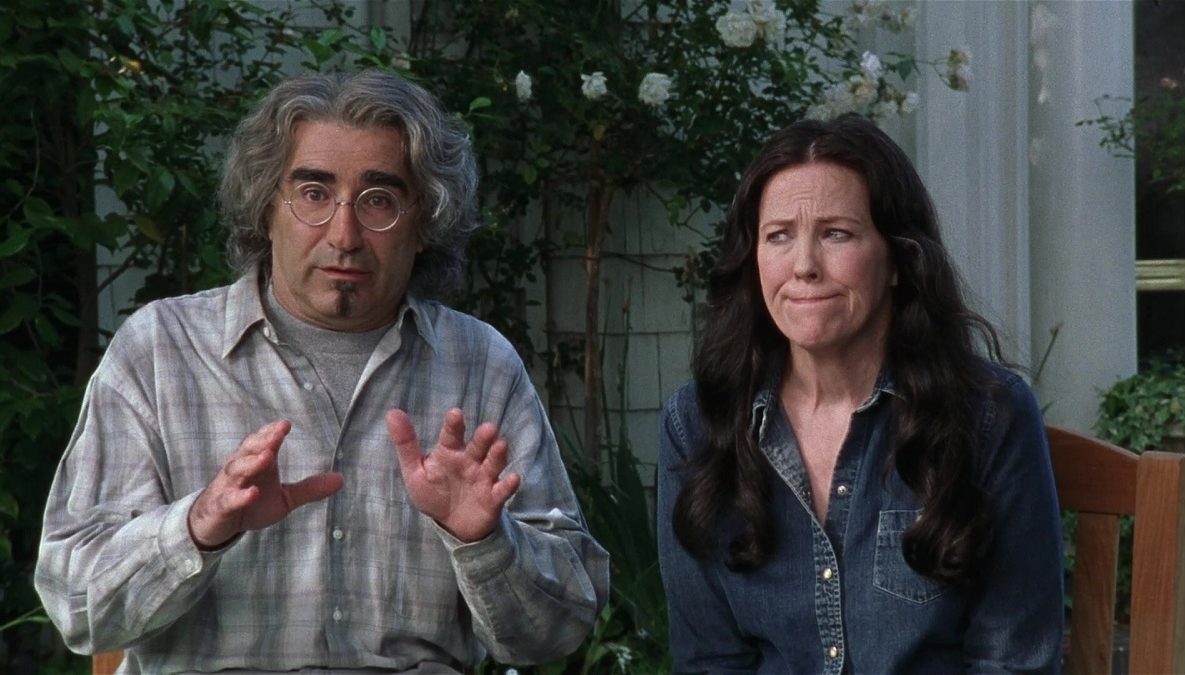

“There was abuse in my family, but it was mostly musical in nature.”
When iconic folk music producer Irving Steinbloom (Stuart Luce) passes away, his son (Bob Balaban) feels that the best way to honor his rich legacy is a televised memorial concert at Town Hall featuring three of his most successful acts: the Folksmen, the Main Street Singers, and the long-estranged duo Mitch & Mickey. With A Mighty Wind, writer/director/star Christopher Guest and co-writer/star Eugene Levy do for classic folk music what they did for community theater (Waiting for Guffman) and prestigious dog shows (Best in Show) in their earlier films. Though satire is the name of the game in Guest’s comedies, the humor of A Mighty Wind is somewhat gentler and factored into a genuinely heartfelt sendup of its subject that comes complete with a handful of toe-tapping original tunes.
There’s probably a fringe character or two that I’m overlooking, but the entire main cast of A Mighty Wind appears to be drawn from Guest’s regular stable of improv actors. Indeed, one of the film’s main selling points is the obvious joy with which each of them inhabits their outrageous characters as they riff off of one another. The familiarity breeds hilarity.
Guest first teamed up with Harry Shearer and Michael McKean on the brilliantly funny This Is Spinal Tap in 1984, chronicling the struggles of a heavy metal band who’d fallen out of favor. Later that same year, the trio appeared on Saturday Night Live as the Folksmen. Like Spinal Tap, they sometimes played legitimate live shows, sharing the stage with acts like Peter, Paul and Mary and Joni Mitchell, and even “opening” for Spinal Tap on occasion.
I feel ready for whatever the experience is that we will take with us after the show. I’m sure it will be an adventure, a voyage on this magnificent vessel into unchartered waters. What if we see sailfish jumping and flying across the magnificent orb of a setting sun?
Levy and Catherine O’Hara play Mitch & Mickey, while Jane Lynch, John Michael Higgins, and Parker Posey head up the neuftet that tours as the second-generation New Main Street Singers. But A Mighty Wind is a true ensemble piece, and Guest and Levy’s roster of oddballs includes failed comedians turned band managers (Fred Willard), theater directors (Michael Hitchcock), Yiddish-spewing musicologists (Ed Begley Jr.), PR flacks (Jennifer Coolidge, Larry Miller), and Mickey’s catheter salesman husband (Jim Piddock).

Early on, the spirit of the 1950s and ‘60s folk scene is deftly captured through “archival” footage and fond tales dredged up in interviews. The era’s relative innocence and optimism are then undercut by the less rosy realities of many folksters’ lives since the boom. While Mitch & Mickey’s storyline provides the solid dramatic backbone for the interwoven stories, Guest and Levy leave ample room for their own brand of humor. To wit, the New Main Street Singers, who’ve taken up a gig working at an amusement park, are led by Lynch’s Laurie Bohner, a former adult film star who has founded a witch coven that worships the power of color (she also seems to be doing a Hillary Clinton impression the entire time?). Fred Willard routinely interrupts the proceedings with catchphrases from a failed television pilot that no one remembers and makes off-color jokes and unwelcome suggestions about the tribute performance. Balaban anxiously fusses over floral arrangements and stage props. Piddock shows off his model train set and cannot shut up about it, prompting Coolidge to remark, “Thank God for model trains. You know, if they didn’t have the model train, they wouldn’t have gotten the idea for the big train.” Levy, so often cast as one-note goofballs, is a treat as the spaced-out depressive who fears the rekindling of his creative fire.
Overriding all of this is a sincere notion that the filmmakers are deeply passionate about their subject matter, evidenced by the care that goes into documenting the spectacle of the live show, the climax of Levy and O’Hara’s performance of ‘Kiss at the End of the Rainbow’, and the unifying performance of the title song at the film’s conclusion. Pound for pound, A Mighty Wind is not Christopher Guest’s best comedy, but it may be his most sincere and genuinely touching homage, swathed in amiable warmth and unironic nostalgia.